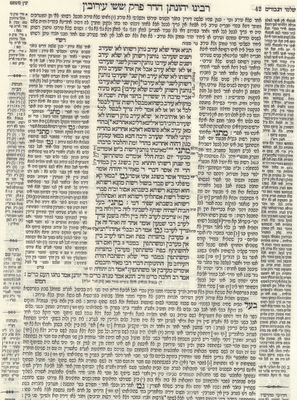
HIDE/SHOW IMAGE
21b
{Eruvin 70a continues}
They learnt {in a brayta}: (1) One who did not join in an eruv may give his rights to one who did make an eruv. (2) And two who joined in an eruv {in a courtyard in which there was a third tenant} may give their rights to one {=the third} who did not join in the eruv. (3) And two who did not join in the eruv may give their rights to two who did join in the eruv, (4) or to one who did not. However, (5) one who did join in an eruv may not give his rights to one who did not join in an eruv, and (6) two who did join in an eruv may not give their rights to two who did not join in an eruv. [And (7) two who did not join in an eruv may not give their rights to two who {also} did not join in an eruv.]
{Across is the recipient, and down is the donor of the rights.}
| 1E | 2E | 1NE | 2NE | |
| 1E | (5) N | |||
| 2E | (2) Y | (6) N | ||
| 1NE | (1) Y | |||
| 2NE | (3) Y | (4) Y | (7) N |
Abaye asked Rabba: Five who dwell in a single courtyard, and one of them forgot and did not join in the eruv, when he renounces his right, must he renounce it to each and every one, or not.
He {=Rabba} said to him: He must renounce to every single one.
He {=Abaye} objected {from the aforementioned brayta}: (1) One who did not join in the eruv may give {his rights} to one who did join in the eruv.
Now, howso? Where there is no other {besides the two}? With whom did this one join in an eruv?! Rather, it is obvious that there is another with him, and the brayta states "to one who joined in the eruv."
And Rabba: With what are we dealing? Such that there was {initially} another with him, and he {=the other} died.
{That is, the purpose of the brayta is to lay out systematically the entire system, on a theoretical level. And we can construct a case where the hypothetical can come to pass. Rabba's explanation of the brayta, even while more farfetched in actuality, is a simpler reading of the systematic format of the brayta.}
And the halacha is like Rabba.
{Eruvin 69b}
Mishna:
When do they {who renounce} give the right?
Bet Shammai says: While it is still day.
And Bet Hillel says: After nightfall.
If the person who gave his right carried, whether unintentionally or intentionally, then this one restricts. These are the words of Rabbi Meir.
Rabbi Yehuda says: Intentionally, he restricts, unintentionally, he does not restrict.
{Eruvin 71a}
Gemara:
In what are they arguing?
Bet Shammai hold that renunciation of domain is acquisition of domain, and acquisition of domain is forbidden on Shabbat.
And Bet Hillel hold that renunciation of domain is just giving up one's domain, and giving up of one's domain on Shabbat is fine.
Mishna:
If a householder was a partner to the neighbors, to this one in wine and to this one in wine, they do not need to make an eruv, to this one in wine and to this one in oil, they need to make an eruv.
Rabbi Shimon says: Neither this nor that needs to make an eruv.
Gemara:
Rav said: {Only if the wine which they possessed in common was kept} in one vessel.
{Eruvin 71b}
They learnt {in a brayta}: An eruv of courtyards is made with bread, and if they wish to make an eruv with wine, they may not. And they may make a shittuf in an alleyway with wine, and if they wish to make a shittuf with bread, they may. We both make an eruv in courtyards and a shittuf in alleyways {even though the shittuf would obviate the need for the eruv} in order that the law of eruv is not forgotten from the children {who might need it in the future, and not realize it is required}. These are the words of Rabbi Meir. And the Sages say: we either make an eruv or a shittuf {but not both}.
{Eruvin 72a}
Rav Yehuda cited Rav: The halacha is like Rabbi Meir.
And Rav Huna said: The minhag is like Rabbi Meir.
And Rabbi Yochanan said: The nation conduct themselves {=nahagu } like Rabbi Meir.



No comments:
Post a Comment